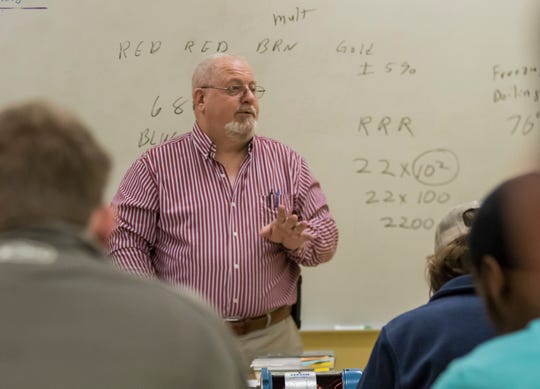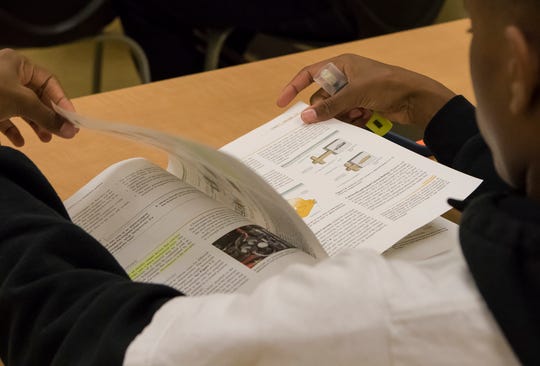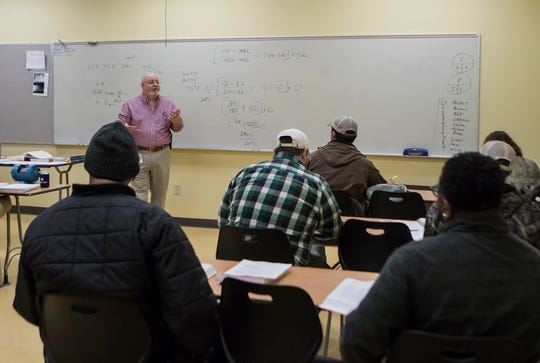LDCC keeps investing in students, strengthening economy

If Amazon doesn't have a Whole Foods grocery near you, there are non-perishable groceries ( food that doesn't spoil) that Amazon can ship to you

Veuer’s Elizabeth Keatinge tells us what the experts say about dream schools, and if all the hype is worth it.
Buzz60
Louisiana Delta Community College is steadily making gains.
The Chronicle of Higher Education in its 2019 Almanac of Higher Education has named Louisiana Delta Community College as the 20th fastest-growing institution in the nation for institutions that award associates and/or baccalaureate degrees.
Between 2007 and 2017, the system increased enrollment by 78%, from 2,059 to 3,666.
Chancellor Dennis Epps said since then, the college has continued to make enrollment increases. In the past year, only Louisiana Community and Technical College System institutions in New Orleans and Baton Rouge had more graduates.
“LDCC has experienced a 20% increase in enrollment for the fall of 2019 compared to the fall of 2018,” said Seth Hall, Executive Director of Enrollment Management at LDCC. Hall further explains, “LDCC’s growth over the past three years has been steady and sustained.”
In 2018, Epps said, enrollment was up 12% year over year. It’s exponential growth. It’s especially notable when overall higher education admissions are seeing a downward trend.
Credit enrollment as of Thursday was 4,412, Epps said. LDCC hasn’t seen such high enrollment numbers since it opened. There was a lag, and now it’s rebounded to at or near its initial numbers.
He said the largest factors driving the change are LDCC’s small classes and personal attention to students; low cost of attendance; and close relationships with employers that benefit students.
 Buy Photo
Buy Photo
Mark Ketchell, center, teaches a motors and motor control class as part of in the high-bay classroom at Louisiana Delta Community College’s instrumentation programs at the campus in Monroe, La. on Jan. 16. The program focuses on teaching students about the various motors used in manufacturing plants. (Photo: Nicolas Galindo/The News-Star)
Meeting students where they are
Epps said the faculty works with individual students to determine what they need to get where they need to go in life.
The chancellor said they’re told that 20% of Louisiana’s high school graduates are college-bound, including community colleges. The other 80% are unsure of long-term plans or unprepared for college. He wants a plan for what to do with the 80%.
“How are we going to get them ready to meet their future?” Epps said. LDCC has expanded dual-enrollment partnerships with local K-12 institutions to get students ready for what’s next. He said local education leadership understands that the key to making Jump Start work for teens is providing training in real skills that employers find valuable.
Still, Epps thinks a lot of students would do well to come to LDCC and adjust to college life before moving to a larger institution.
Overall, he said, they’re attracting a broader demographic. The two largest increases are first-generation college students and those who already have a bachelor of arts and are returning for job training.
Particularly for students who are the first in their families to attend college, the process can be challenging. Having personalized attention can make it easier to navigate, Epps said.
Darian Atkins, executive director of community and public relations for LDCC, said reaching low-income students and helping them to succeed draws more students who’ve seen friends and family move on to solid jobs.
“We’re seeing a lot of adults who are unemployed or underemployed that are figuring out Delta is the pathway to a better life,” Epps said. “And we want to continue to see that trend.”
The old “get a degree, any degree” adage doesn’t work anymore, he said. Bachelor’s degrees are no longer rare. Students who already have degrees that don’t correlate with the job market are coming back for certifications and training that lead to higher wages.
Business and industry training helps people who already have jobs get training that leads to promotions.
LDCC also hosts TRIO: Veterans Upward Bound program. The U.S. Department of Education’s TRIO program is designed to assist veterans in developing academic skills to be successful in a program of post-secondary education or other requisite skills, regardless of what higher education institution they’re attending.
When Epps started working at LDCC three years ago, the average student age was 24. Now it’s 27.
UL System president: We’ve got to change our message
 Buy Photo
Buy Photo
Mark Ketchell teaches a motors and motor control class as part of Louisiana Delta Community College’s instrumentation programs at the campus in Monroe, La. on Jan. 16. The program focuses on teaching students about the various motors used in manufacturing plants. (Photo: Nicolas Galindo/The News-Star)
More: Louisiana community colleges among top 100 ‘fastest-growing’ in the country
Keeping costs low
Being able to make education dollars stretch is a big draw for students planning to transfer and those on the technical training path.
“I am at war with student loan debt,” Epps said. Many students graduate with no loan debt.
He said nationally student loan debt is a crisis that keeps people from being able to buy a home. Ultimately, that makes communities weaker.
“Full-time students at LDCC taking 12 to 15 hours a semester are charged $2,079.52 for tuition and fees, which is less than half the cost for the majority of four-year universities in the state and across the country,” Hall said.
Epps said those cost savings are drawing top-performing high school students who want to make their money go further. He said one student talked about saving more of his TOPS funds for grad school by finishing core credits at LDCC before transferring.
LDCC classes can be applied to four-year schools in Louisiana and most other SACS-accredited institutions. Epps said they have general articulation agreements between institutions in Louisiana, but not all courses fit under programs at the college or university. He said students are advised to work closely with faculty and staff to ensure they take the courses they’ll need in the full four-year track.
 Buy Photo
Buy Photo
A student of the motors and motor control class flips through the class book for Louisiana Delta Community College’s instrumentation programs at the campus in Monroe, La. on Jan. 16. The program focuses on teaching students about the various motors used in manufacturing plants. (Photo: Nicolas Galindo/The News-Star)
Developing relationships with businesses
The technical programs have high placement rates with local business and industries.
“Students tell me that one of the main reasons they’ve decided to come here is because they know it actually translates to a real job. They’re not just getting an education in hopes, but they know they’re in line to compete for some real opportunities that are here. The vast majority of our students want to stay here in our area,” he said.
The Certified Nursing Assistant program was named the third-best in Louisiana by registerednursing.org.
“We’re pretty proud of that. It seems like lately the accolades keep rolling up on us,” Epps said, touting the program’s 100% placement rate.
LDCC has altered curriculum based on feedback from companies like Angus and Graphic Packaging to graduate workers that are fully prepared for the job. Medical students work clinical with existing businesses.
Students are doing more internships earlier in their studies to make sure that’s what they’d like to do, not at the end of the program.
“If your job requires climbing on top of a cell tower, why don’t we do that on the first day instead of after you graduate?” Epps laughed.
It’s solutions-based.
Atkins said a lot of those relationships exist because Epps came to the job with experience in business and education. He understands what industry leaders are facing and how to package solutions that work for them.
“His background really opened the door for us to be able to carve out a niche because we haven’t had a niche before,” she said.
For Epps, it’s about building a strong regional economy, not accolades. He wants to help businesses to grow, and that involves asking leaders what they need today and what they will need tomorrow. Then they work in partnership to make it happen.
“We want to be the most powerful magnet that we can be for additional investment in northeast Louisiana,” he said. That requires investing in cutting-edge technology for students.
 Buy Photo
Buy Photo
Mark Ketchell teaches a motors and motor control class as part of Louisiana Delta Community College’s instrumentation programs at the campus in Monroe, La. on Jan. 16. The program focuses on teaching students about the various motors used in manufacturing plants. (Photo: Nicolas Galindo/The News-Star)
Growing in every sense
Epps thinks facility improvements and expansions also have helped spur enrollment. When students go into a modern training facility, they see that the school and the community are investing in them and their lives.
LDCC has sites in Monroe, Bastrop, Jonesboro, Lake Providence, Ruston, Tallulah, West Monroe and Winnsboro.
In September, LDCC cut the ribbon on an $8.2 million addition to the Advanced Technology Center at the main campus in Monroe. It created an additional high bay lab area for manufacturing training, meeting rooms to accommodate large groups, and additional classrooms. The expanded facility also will house the Louisiana Small Business Development office for the state.
LDCC also recently celebrated an expansion at the Tallulah campus’ main building to add additional space for the nursing program: nursing classrooms, a biology lab, and office space.
Epps said LDCC is having parking distress at the main campus and in Winnsboro.
It’s a great problem to have.
They’re expanding parking.
Information from a news release contributed to this report.
Read or Share this story: https://www.thenewsstar.com/story/news/education/2019/10/12/louisiana-delta-community-college-ldcc-investing-students-strengthening-economy/3902421002/

 College Dorm and Apartment Cooking gadgets - if you change the sort settings on the Amazon page, it will show other items by price
College Dorm and Apartment Cooking gadgets - if you change the sort settings on the Amazon page, it will show other items by price

















